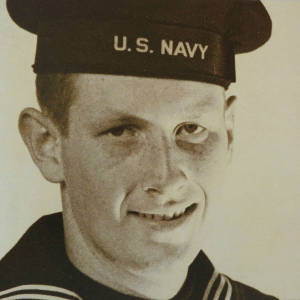An LST Landing
This is a photograph of Ned standing at the ship's rail, watching the after effects of a Japanese raid.
The following is a description he wrote of an LST landing:
A dim white froth showed the bow wave stretching out into the velvet darkness. Aft, over the fantail, the wake of the LST disappeared into nothing. The wind came gently from the south-west in barely perceptible puffs, lifting the exhaust of the main engines into the air around the bridge. A slow ground swell from the south-east rolled the vessel easily from her port quarter. Looking into the black void of the wheel house, a faint glow floated in the darkness; the helmsman's face reflecting the light from the gyro-repeater.
To the man leaning on the rail of the bridge, out on the port wing, everything seemed to stand still. The roll of the ship, and the blue wake light of the ship ahead were the only things belying this. Forward, in the bow gun tub, the watch was quiet, one man at his post, the other nodding in his seat on the gun.
The deck clock on the bulkhead showed the time to be 0430, and the boatswain was below calling out the men for battle stations. The day was October 20, 1944. Quietly and quickly the men manned their stations, each talker calling in when ready. The ship was ready.
The quartermaster on watch, leaning on the rail, did not know what was ahead, and didn't much care. It had taken so long to get there that this moment was more of an anticlimax than he had imagined.
Faintly, very faintly, it dawned on him that land was near. He knew this from the radar scope, but that didn't mean anything. This realization was brought about by the smell of smoke. Burning palm trees give off a sweet cloying scent, it made him shiver a little. Nothing had changed, the darkness was still opaque, nothing could be seen, but the air had changed about the ship. Tension mounted swiftly as word was passed that the convoy was in the gulf. It wasn't long until the watch on the bridge felt more than heard the irregular pulsation of the broadsides from the wagons up the bay.
The light was dim from the lights far above the tank deck. Dark forms moved about in the gloom, working over the bulky forms of the amphibious tanks. Radio men were checking their sets, and the drivers warmed their engines. The roar was deafening.
Aft and above the tank deck, in the crew's quarters, the Infantry gathered in small groups at the mess tables. One such group in particular, old hands at this game, were playing cards. They had done this same thing many times in the past at such places as Attu, Dutch Harbor, Kwajelein, Biak, and other lesser known plots of real estate. Orders were orders, so these men had daubed on the camouflage paint; their faces black-green, and where there was no paint, yellow from the atabrine. Cards were dealt, money lost and won as the ship moved into line.
A blast of static and background noise on the radio preceded the order which sent the two companies of 7th Division infantry into their tanks. The last to board their vehicles was the group at the card table. The sergeant had to wait while they finished the hand and put out their smokes.
The click of the sledge hammer striking the pelican hook was clearly audible to all on deck, so quiet was the area; the roar of the chain through the hawse pipe broke the silence. Slowly the bow doors swung open and the ramp came down till it was submerged in the water. The helmeted figure in dungarees and life jacket beckoned toward the black maw of the tank deck and was answered by a roar of tank engines.
- 4
- 2
- Nikon COOLPIX P900
- 1/60
- f/2.8
- 4mm
- 100

Comments
Sign in or get an account to comment.


